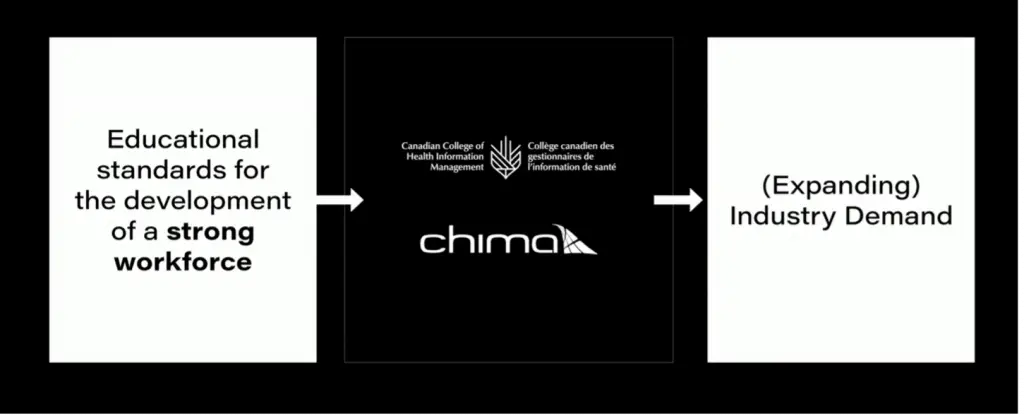What is the real impact of health information?
With the growing significance of health data and health information professionals, the question arises: What is the real impact of health information?
At the last session of Health Information Professionals (HIP) Week 2021, Jeff Nesbitt, CEO and registrar of the Canadian College of Health Information and the Canadian Health Information Management Association (CHIMA), and Matt Aubie, creative director of Aubs & Mugg Inc., discussed this topic. The conversation emphasized the College and CHIMA’s current efforts to expand the health information landscape and drew insights from a strategic plan research conducted by Aubs & Mugg in 2021.
Matt urged attendees to consider the individual at the centre of care as a first step to understanding the real impact of the profession. Health information tells a person’s unique story, making health information professionals stewards of these stories.
As health information professionals begin to function in more non-traditional spaces like consulting firms, technology, etc., and access to health data becomes more person-centred, the real impact of health information is felt in the stewardship and governance of this data. This data stewardship creates a range of efficiencies and areas where health information professionals can thrive. Therefore, Matt emphasized the need for more inclusivity in the definition of health information and connectedness across the health information landscape.
Jeff shed some light on the silos of information that exist in system structures and the need for conversations with stakeholders to create a person-centred structure. He highlighted the work of the pan-Canadian Health Strategy Expert Advisory Group and the importance of joining such discussions to build bridges to the future of the health information profession.

Jeff mentioned some ongoing efforts of the College and CHIMA to build these bridges:
- Our certifications, (which represent the national standard of excellence)
- Our communities (e.g., information governance, clinical documentation improvement, and terminology standards)
- Expanding partnerships with the industry and government
- Deepening of diploma and degree standards for health information management
To meet the growing appetite for health data, Matt urged those on the line to recognize their unique skills, education, and experiences as assets in the expanding landscape of the profession.
The discussion featured a question-and-answer session with valuable insights. However, time prevented the speakers from answering them all. Jeff has taken the time to answer some of the unanswered questions.
Q: Since many organizations’ education budgets are dwindling (or non-existent!), how can we convince our managers that we need additional training or education to be prepared for roles in these new settings in the future?
A: Organizations consider education as a factor for talent attraction and retention. Therefore, we have developed the CHIMA Annual Team Learning Subscription, a cost-effective approach for learning and development for organizations. This subscription service provides employers with an affordable opportunity to support employees to access professional development offerings and online events from CHIMA. We encourage you to raise this opportunity with your leadership and are happy to connect for a discussion.
Q: Digital health seems to be the future with more advanced dashboards/scorecards so data can be more easily retrieved and accessed by clinical staff. But with this, it seems some organizations are employing more statistical information people rather than HIM professionals. How do we HIM professionals ensure we aren’t forgotten in this more advanced digital reporting of information?
A: Analytics, information curation, and technology are critical competencies that have been identified in our new health information fundamentals and health information management curricular standards. We are actively developing and partnering to provide educational offerings in this space to ensure our profession has access to the necessary skills and abilities that make a difference to employers.
Q: With increased opportunities in the industry, what specific measures are CHIMA and the College taking to increase membership or the capacity of existing programs?
A: The College has been actively expanding the number of academic partners in our ecosystem. We have announced new partners over the past year and expect this trend to accelerate based on leading demand indicators for the College’s certifications.
Q: Regarding privacy, will we be seeing a partnership between CHIMA and the International Association of Privacy Professionals (IAPP) in the future?
A: We are currently assessing opportunities in privacy practice. We are open to adapting to new privacy models and discussions with the federal, provincial, and territorial governments in this regard.






